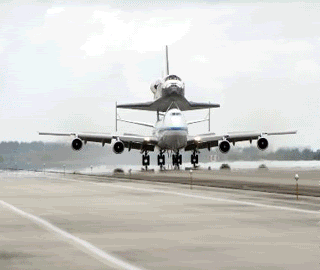 NASA bulldozed two spacecraft into the lunar south pole Friday morning in a search for hidden ice.
NASA bulldozed two spacecraft into the lunar south pole Friday morning in a search for hidden ice.Instruments confirm that a large empty rocket hull barreled into the moon at 7:31 a.m. followed four minutes later by a probe with cameras taking pictures of the first crash.
But the big live public splash NASA had hoped for didn't quite happen. Screens got fuzz and no immediate pictures of the crash or the 6-mile (10-kilometer) plume of lunar dust that the mission was all about.
NASA officials said their instruments were working, but the planned live photos were missing.
Nearly half an hour after the crash, NASA was promising pictures updated to its Web site. But so far all NASA had was "images on the way in," said NASA spokesman Grey Hautaluoma. People who got up before dawn to look for the crash at Los Angeles' Griffith Observatory exchanged confused looks.
Telescope demonstrator Jim Mahon called the celestial show "anticlimactic." "I was hoping we'd see a flash or a flare," Mahon said. The first and much bigger crash was supposed to hit with the force of 1.5 tons of TNT into crater Cabeus and create a mini-crater about half the size of an Olympic pool. The second crash was to be about only one-third as strong. The idea is to confirm the theory that water — a key resource if people are going to go back to the moon — is hidden below the barren moonscape.
The images were to come from the probe itself. The probe is LCROS S, short for Lunar Crater Observation and Sensing Satellite and pronounced L-Cross. It had five cameras and four other pieces of equipment to look for ice or any form of water as it dove through the dust storm created by the empty hull. NASA did broadcast live pictures of a moon that was getting closer to LCROSS, but no plume.
S, short for Lunar Crater Observation and Sensing Satellite and pronounced L-Cross. It had five cameras and four other pieces of equipment to look for ice or any form of water as it dove through the dust storm created by the empty hull. NASA did broadcast live pictures of a moon that was getting closer to LCROSS, but no plume.
Until the glitch with live images, NASA was riding high, reporting no trouble at the Ames Research Center in California, where the mission was being controlled.
"Everything is working so very well," NASA's Victoria Friedensen, a manager in NASA's exploration office, said minutes before the planned one-two smack into the moon's south pole.
 S, short for Lunar Crater Observation and Sensing Satellite and pronounced L-Cross. It had five cameras and four other pieces of equipment to look for ice or any form of water as it dove through the dust storm created by the empty hull. NASA did broadcast live pictures of a moon that was getting closer to LCROSS, but no plume.
S, short for Lunar Crater Observation and Sensing Satellite and pronounced L-Cross. It had five cameras and four other pieces of equipment to look for ice or any form of water as it dove through the dust storm created by the empty hull. NASA did broadcast live pictures of a moon that was getting closer to LCROSS, but no plume.Until the glitch with live images, NASA was riding high, reporting no trouble at the Ames Research Center in California, where the mission was being controlled.
"Everything is working so very well," NASA's Victoria Friedensen, a manager in NASA's exploration office, said minutes before the planned one-two smack into the moon's south pole.








No comments:
Post a Comment